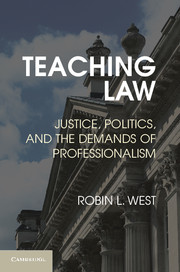Book contents
- Frontmatter
- Dedication
- Contents
- Acknowledgment
- Introduction The Trouble with Law Schools
- 1 The Unbearable Lightness of Justice
- 2 Politics and Its Discontents
- 3 The Bifurcated Academy: The Practice versus the Study of Law
- 4 Confronting Our Existential Challenge
- Some Conclusions
- Bibliography
- Index
- References
1 - The Unbearable Lightness of Justice
Published online by Cambridge University Press: 05 June 2014
- Frontmatter
- Dedication
- Contents
- Acknowledgment
- Introduction The Trouble with Law Schools
- 1 The Unbearable Lightness of Justice
- 2 Politics and Its Discontents
- 3 The Bifurcated Academy: The Practice versus the Study of Law
- 4 Confronting Our Existential Challenge
- Some Conclusions
- Bibliography
- Index
- References
Summary
I have said to my brethren many times that I hate justice, which means that I know if a man begins to talk about that, for one reason or another he is shirking thinking in legal terms.
Oliver Wendell Holmes, in a letter to John WuOne of the most long-standing complaints about American law schools, recently eclipsed by the economic and professional crises, is that law schools produce amoralists. Critics of legal education from across the political spectrum and from a range of disciplines, and for several decades now, have argued that law students come to law school with a sense of moral right and wrong, a well-tuned ethical compass, and even a rough feel for justice. Furthermore, many of them come wanting to enter careers of public service, to help the downtrodden or the wrongly accused, or simply to provide needed legal assistance to the poor. Three years later, those same students leave law schools as graduates ready to sell their services as a hired gun to the highest bidder, skeptical of either the existence or the objectivity of right and wrong or good and bad. Law school, then, according to many of the academy’s critics, must be responsible for this dreadful transformation. The schools dull their students’ moral sense: they weaken moral intuitions; they loosen the grip of conscience; and at best, they narrow the student’s felt obligation to serve justice into a narrow concern for fidelity to clients. While in school, students learn, through their law school training, that not only is goodness fragile but that justice is unbearably light: “subjective,” effervescent, and utterly irrelevant. Money, power, and market choice, on the other hand, are objective, weighty matters, both for themselves and the clients they will serve. That is quite a change. Law school does this to them.
- Type
- Chapter
- Information
- Teaching LawJustice, Politics, and the Demands of Professionalism, pp. 43 - 92Publisher: Cambridge University PressPrint publication year: 2013



